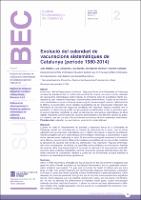Evolució del calendari de vacunacions sistemàtiques de Catalunya (període 1980-2014)
Autor
Fecha
2014-02Enlace permanente
https://hdl.handle.net/11351/2078ISSN
0212-6340
DL
B. 9672-1980
Resumen
Cuando en 1980 el Departamento de Sanidad y Seguridad Social de la Generalitat de
Catalunya recibió las transferencias en materia de promoción de la salud, creó el primer
calendario de vacunaciones sistemáticas, con el objetivo de mejorar la salud de la población
infantil susceptible de sufrir determinadas enfermedades infecciosas y transmisibles. A partir
de las intervenciones realizadas en estos 34 años se ha conseguido mantener la eliminación
de la difteria y la poliomielitis. Otras enfermedades susceptibles de ser prevenidas mediante
la aplicación de vacunas han tenido una disminución muy importante. Algunas enfermeda-
des como el sarampión, la rubéola y la parotiditis están próximas a su eliminación. Además
de alcanzar estos importantes objetivos de salud, el calendario de vacunaciones sistemáti-
cas tiene otras utilidades importantes: permite conocer las vacunas administradas a las dife-
rentes cohortes de la población catalana y puede ser una herramienta útil para entender la
dinámica de determinados brotes epidémicos
Palabras clave
Calendario de vacunaciones; Vacunaciones sistemáticasCitación recomendada
Batalla-Clavell J, Urbiztondo-Perdices L, Borràs-López E, Martínez-Marcos M, Cabezas-Peña C. Evolució del calendari de vacunacions sistemàtiques de Catalunya (període 1980-2014). Butll Epidemiol Catalunya. 2014;35(2):15-23.
Audiencia
Professionals
Este elemento aparece en las siguientes colecciones
- DS - Articles científics [409]
El ítem tiene asociados los siguientes ficheros de licencia:

 Área privada
Área privada Contacto
Contacto







